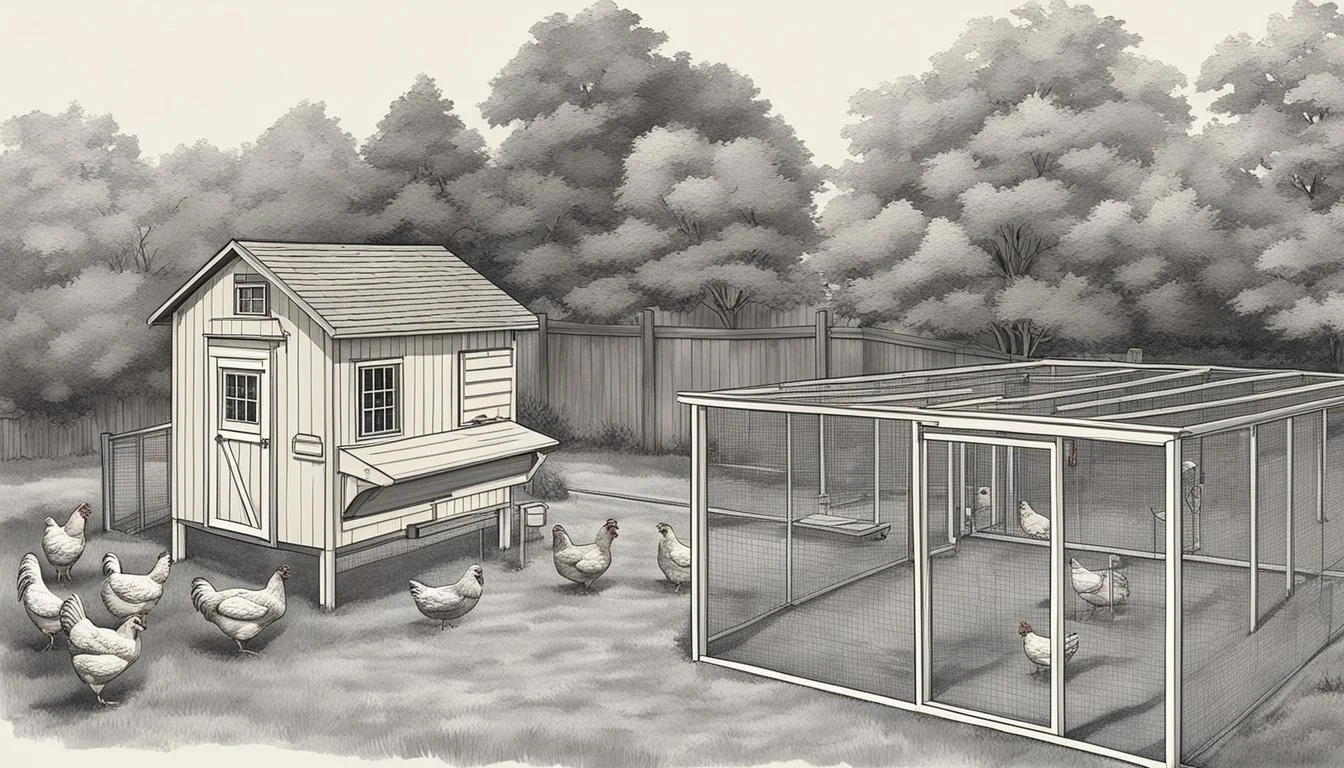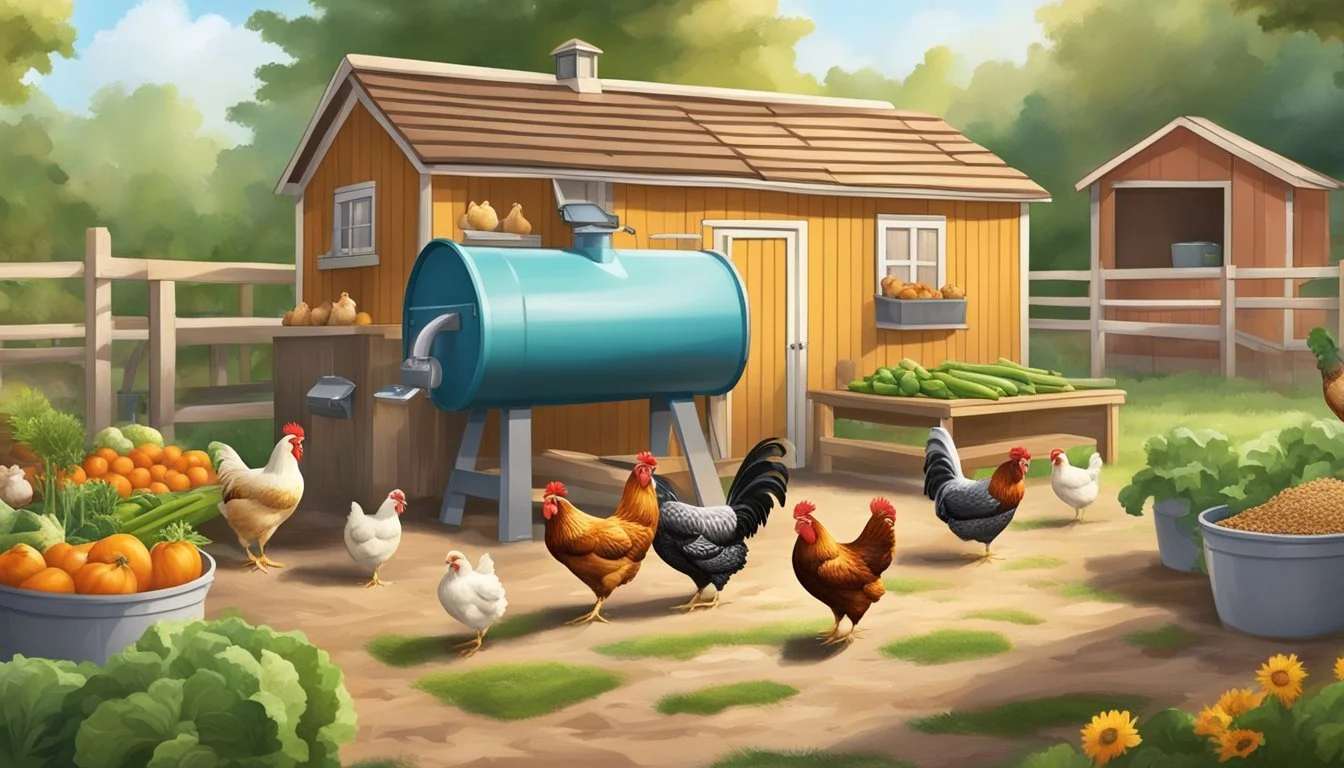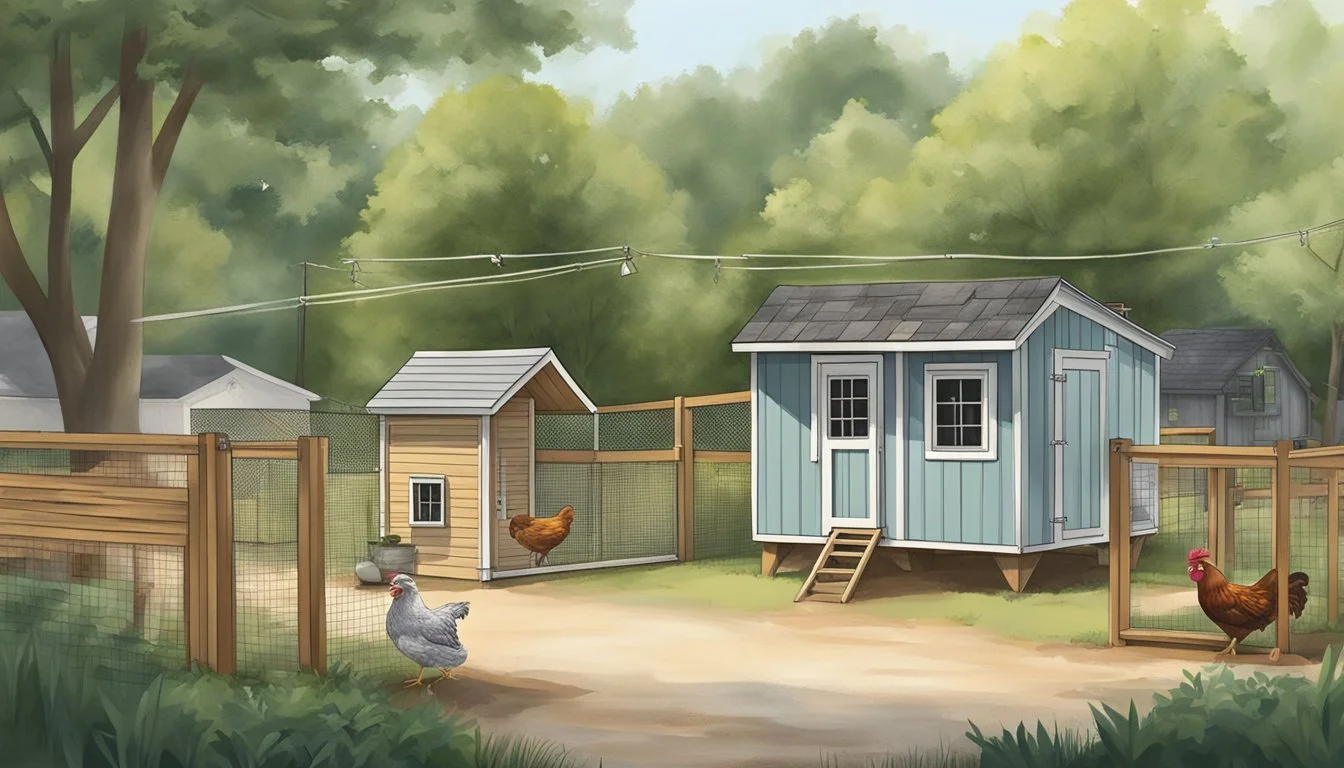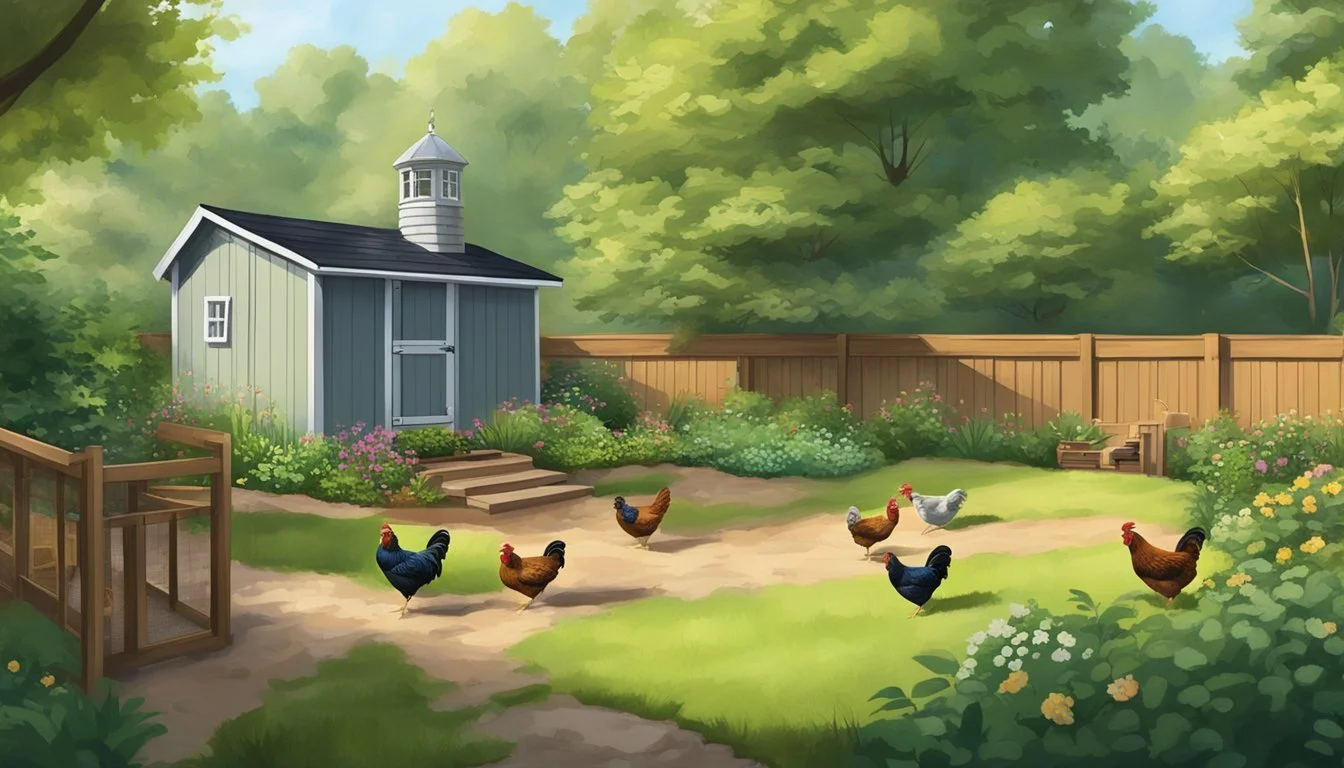Keeping Backyard Chickens in Sandy Springs, GA
Essential Tips and Regulations
Urban homesteading has found a comfortable niche in Sandy Springs, GA, where residents have embraced the trend of raising backyard chickens. The bucolic charm of keeping chickens has gained traction, not only as a means of producing fresh, organic eggs but also for the benefits of natural pest control and the enjoyment of chicken-keeping as a hobby. The city's regulations, specifically tailored to address urban livestock, allow citizens to engage in this practice, though adherence to specific guidelines is a must to maintain harmony within the community.
The ordinances in Sandy Springs stipulate certain conditions to ensure that the keeping of backyard chickens does not disrupt the neighborhood. A key rule is the requirement of a 25-foot distance from any occupied building other than the owner’s dwelling for chicken coops or enclosures. This consideration effectively mitigates concerns about noise and odor that may affect nearby neighbors. Additionally, individuals interested in undertaking this activity must verify that their property falls within the appropriate residential zoning districts, a process easily handled through a consultation with the local zoning department.
Understanding the local laws is only the first step in the journey of raising chickens in one’s own backyard. Prospective poultry enthusiasts in Sandy Springs must familiarize themselves with the essentials of chicken care, from selecting suitable breeds to designing a secure coop and run. This ensures the well-being of the chickens and ultimately, the success and sustainability of one's backyard flock.
Sandy Springs Ordinances for Backyard Chickens
Residents of Sandy Springs, Georgia interested in raising backyard chickens must adhere to specific local ordinances. Understanding and complying with these regulations is key to legally keeping chickens on your property.
Understanding Local Laws and Regulations
Sandy Springs enforces local ordinances that every prospective backyard chicken owner must follow. It's crucial to consult the local zoning department to determine if your property is situated in a residential zone permitting the raising of chickens. The City of Sandy Springs provides a Development Code and Zoning Map, revised as of September 15, 2017, which outlines where chickens can be legally kept.
Permit Requirements in Sandy Springs
Permits may be necessary for residents to legally own backyard chickens in Sandy Springs. The specific process for acquiring a permit involves contacting city authorities and following the prescribed steps, which include compliance with certain conditions and paying any associated fees. Code compliance is rigorously enforced to ensure public safety and community standards are maintained.
Zoning and Property Restrictions
Zoning laws in Sandy Springs are detailed and must be observed by all residents wishing to keep chickens. The city has designated certain residential zones where raising chickens is allowed. Property restrictions can also come into play, such as HOA covenants that override city laws. Potential chicken owners should review these covenants, as well as state and local laws, to ensure all regulations are met before establishing a backyard coop.
Raising Chickens in Suburban Settings
Raising chickens in suburban environments such as Sandy Springs, GA requires careful planning to choose appropriate breeds, set up an efficient coop, and manage the daily care of the birds.
Choosing the Right Breed of Chicken
When selecting chickens for a suburban backyard, one should consider the breed's temperament and noise level. Quieter breeds are more suitable for densely populated areas to minimize disturbances to neighbors. The American Poultry Association recognizes various breeds that can thrive in backyard settings. Suitable breeds for suburban areas often include the Plymouth Rock, Rhode Island Red, and Australorp due to their ability to adapt to confined spaces, friendly nature, and consistent egg-laying capacity.
Setting Up Your Chicken Coop
A chicken coop in a suburban setting must be designed to provide adequate space and cleanliness. Each chicken requires at least 2-3 square feet inside the coop and 8-10 square feet in an outdoor enclosure. The coop must be well-ventilated to keep the air fresh and prevent moisture buildup, which could lead to health issues. Predatory-proof construction with secure latches is crucial to protect the chickens.
Sturdy construction: to keep predators out.
Proper ventilation: windows or vents above the chickens' roosting area.
Ease of cleaning: removable droppings tray and accessible design for regular maintenance.
Adequate shelter: protection from the elements.
Daily Care and Management
Daily rituals play a pivotal role in maintaining the health and happiness of backyard chickens. Clean, fresh water must be available at all times, and the coop should be checked and cleaned regularly to prevent the build-up of waste and to deter pests. Chicken feed should be high quality and suited to the age and type of the chickens, supplemented with kitchen scraps and insects for additional nutrition. Regular health checks are important to catch any problems early.
Checklist for Daily Care:
Provide a consistent supply of food and fresh water.
Remove waste and surplus food to maintain hygiene.
Monitor the chickens for signs of illness or distress.
By following these specific guidelines for breed selection, coop setup, and daily management, one can successfully keep chickens in a suburban setting like Sandy Springs, GA.
Health and Nutrition
When keeping backyard chickens in Sandy Springs, GA, maintaining the health and nutrition of the flock is crucial. One should focus on preventative measures against diseases and parasites, provide balanced feed for optimal health, and ensure regular check-ups with a veterinarian.
Preventing Diseases and Parasites
Chickens are susceptible to a range of diseases and parasites which can threaten their health. Maintaining clean living conditions is essential in preventing outbreaks. Regular coop cleaning and proper waste disposal significantly reduce the risk of disease. Additionally, adding diatomaceous earth to the chickens' dust-bathing areas can help prevent lice and mites.
Feeding for Optimal Health
Chicken feed is the foundation of good nutrition and overall flock health. An ideal chicken diet includes a balanced mix of proteins, carbohydrates, fats, vitamins, and minerals. In Sandy Springs, GA, one must select feed specifically formulated for the bird's life stage—chick starter, grower feed, or layer pellets. Furthermore, supplementing the chicken's diet with kitchen scraps can provide extra nutrients, but should not exceed 10% of their food intake to prevent nutritional imbalances.
Routine Veterinary Care
Regular veterinary check-ups enable early detection and treatment of health issues. Even in the absence of visible signs of illness, scheduled health evaluations by a veterinarian can help ensure that chickens remain in good health. Some diseases may require vaccinations, which a specialist should administer according to local rules and regulations, such as those pertaining to Sandy Springs, GA.
Legal and Ethical Considerations
When keeping backyard chickens in Sandy Springs, GA, residents must navigate specific legal requirements while also considering the ethical implications on their community and environment.
Understanding Slaughtering Regulations
In Sandy Springs, it is important for residents to be aware of the local ordinances concerning the slaughtering of chickens. The law may permit raising chickens for eggs, but slaughtering them may be subject to stricter regulations or even prohibited. Individuals should consult with the Sandy Springs city code to ensure they comply with any slaughter-related restrictions to avoid legal repercussions.
Waste Management and Composting
Proper waste management is an essential aspect of maintaining backyard chickens. The Sandy Springs community expects owners to keep their property clean and odor-free.
Waste Management: Regular cleaning is mandatory to maintain hygiene and prevent attracting pests.
Composting: Chicken waste can be composted; however, it must be done in such a way that it does not create a nuisance or health hazard to the neighborhood.
Community Relations and Neighborly Practices
Community relations play a pivotal role in the practice of raising backyard chickens. Residents should consider how their activities could affect their neighbors.
Noise Control: While hens are generally quiet, steps should be taken to minimize any possible disturbances.
Property Line Awareness: Chickens must be secured within the owner's property, adhering to local stipulations regarding distance from neighboring homes.
Owners should endeavor to foster good relationships with their community by ensuring their chicken-keeping practices don't negatively impact the neighborhood.
Additional Resources for Chicken Owners
For residents of Sandy Springs, GA interested in or currently raising backyard chickens, a wealth of resources is available to support their endeavors. From educational opportunities to sourcing the necessary supplies, the community provides various avenues to assist both novices and experienced backyard chicken enthusiasts.
Educational Workshops and Community Groups
Community groups and workshops provide invaluable opportunities for learning and networking. The Sandy Springs Permaculture Club, for instance, often hosts events where individuals can learn about caring for backyard chickens, understanding local ordinances, and integrating chickens into a sustainable garden system. Additionally, regional agricultural extension offices often hold educational workshops on a variety of topics relevant to backyard poultry keeping.
For those seeking a more hands-on experience, local farms may offer workshops where attendees can interact with chickens and learn directly from experienced poultry keepers. These gatherings are excellent for networking with other backyard chicken enthusiasts and gaining insights into best practices for poultry care in the Georgia climate.
Where to Buy Chickens and Supplies
When it comes to buying chickens or chicks, local hatcheries are the go-to source. They not only assure healthy birds adapted to the local environment but also provide specific breed options suitable for backyard setups. Below is a list of recommended hatcheries and supply stores in and around Sandy Springs:
Little Cluckers Hatchery - Offers a variety of chicks and juvenile chickens, specializing in breeds that are well-adapted to the Georgia climate.
Sandy Springs Farm & Garden Supply - A comprehensive supplier where owners can find feed, coops, and other necessary supplies for raising chickens.
Purchasing from reputable local sources ensures that the chickens are vaccinated and free from diseases, which is crucial for the flock's longevity and productivity. Chicken owners should ensure they are obtaining their supplies from stores that provide quality products and knowledgeable service.
FAQs and Troubleshooting
Keeping backyard chickens in Sandy Springs comes with its set of common issues and questions. This section provides insights on troubleshooting and expert Q&A to better manage your flock.
Addressing Common Issues with Backyard Chickens
Predators: One of the most frequent challenges faced by chicken owners in Sandy Springs is the threat of predators. To protect your flock, ensure your coop is secure with proper fencing and consider adding an overlay of hardware cloth. Regularly inspect for weaknesses and potential entry points where predators could breach the coop.
Disease: Vigilance in monitoring for signs of illness is crucial. Consult a veterinarian if your chickens exhibit unusual symptoms such as lethargy, respiratory distress, or a drop in egg production. Implementing solid biosecurity measures, such as controlling access to your flock and maintaining cleanliness, is key in disease prevention.
Egg Production: If egg production begins to decline, first consider the possibility of natural causes like aging or molting. Also, consistent egg production requires ample nutrition, so one should evaluate whether their chickens' diet meets all necessary dietary requirements, including a sufficient amount of protein, calcium, and access to clean water.
Questions and Answers from Experts
Q: How can I tell if my chicken is sick? A: They might show signs including changes in behavior, abnormal droppings, loss of appetite, or drops in laying. Any persistent, unusual symptoms should prompt a visit to a veterinarian skilled in poultry health.
Q: What should I do if my chicken is attacked by a predator? A: In the immediate aftermath, separate the injured chicken from the flock and consult with a veterinarian for treatment options. Review your coop's security setup to prevent future attacks.
Q: Can I feed my chickens kitchen scraps? A: While chickens can benefit from many kitchen scraps, they should not consume anything moldy, salty, fatty, or containing raw beans, chocolate, or avocado pits and skins as these can be harmful.
Keeping backyard chickens is rewarding but includes challenges such as predator protection, maintaining health, and ensuring consistent egg production. Engaging with knowledgeable staff or fellow poultry enthusiasts for advice can enhance one's chicken-keeping experience.








